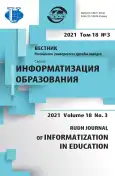Оценка курсантами вуза МВД России эффективности применения электронной образовательной среды Moodle до и во время пандемии коронавирусной инфекции COVID-19
- Авторы: Лопатин Е.А.1, Шкабин Г.С.2
-
Учреждения:
- Московский университет Министерства внутренних дел Российской Федерации имени В.Я. Кикотя, Рязанский филиал
- Научно-исследовательский институт Федеральной службы исполнения наказаний
- Выпуск: Том 18, № 3 (2021)
- Страницы: 212-226
- Раздел: ЦИФРОВАЯ ОБРАЗОВАТЕЛЬНАЯ СРЕДА
- URL: https://journal-vniispk.ru/2312-8631/article/view/321214
- DOI: https://doi.org/10.22363/2312-8631-2021-18-3-212-226
- ID: 321214
Цитировать
Полный текст
Аннотация
Проблема и цель. Начало пандемии коронавирусной инфекции СOVID-19 привело к повсеместному переходу вузов страны и мира на дистанционное обучение. Анализ имеющихся исследований в России, ЮАР, Швейцарии и других странах мира позволил сделать вывод о недостаточности сравнений оценок применения дистанционных образовательных технологий до пандемии коронавирусной инфекции и после прохождения ее первых волн. Изучается проблема оценки возможностей электронной информационной образовательной среды (ЭИОС) Moodle в образовательной организации системы МВД России до и во время пандемии. Методология . Проведено сравнение результатов анкетирования среди курсантов Рязанского филиала Московского университета МВД России имени В.Я. Кикотя в 2017 и 2021 гг. Результаты. Выявлено, что после первых двух волн пандемии и постепенного возвращения к более традиционной очной форме обучения среди курсантов вуза МВД России не осталось редко использующих ЭИОС Moodle. Возросло количество положительных оценок эффективности использования Moodle и ее влияния на снижение временных затрат на учебу. Объясняется выявленный запрос обучающихся на совершенствование средств дистанционного обучения, в частности в направлении снижения сложности, повышения занимательности, снижения сроков проверки материалов. Заключение. Работа в электронной информационной образовательной среде стала привычной для обучающихся, пришло осознание необходимости решения мелких проблем. В сознании укоренилось понимание неизбежности внедрения в очное обучение элементов дистанционного обучения.
Об авторах
Егор Александрович Лопатин
Московский университет Министерства внутренних дел Российской Федерации имени В.Я. Кикотя, Рязанский филиал
Автор, ответственный за переписку.
Email: eg.lopatin@gmail.com
кандидат педагогических наук, доцент кафедры социально-гуманитарных дисциплин
Российская Федерация, 390043, Рязань, ул. 1-я Красная, д. 18Геннадий Сергеевич Шкабин
Научно-исследовательский институт Федеральной службы исполнения наказаний
Email: uprzn@ya.ru
доктор юридических наук, доцент, главный научный сотрудник НИЦ-2
Российская Федерация, Москва, 119991, ул. Житная, д. 14Список литературы
- Romero E, García L, Ceamanos J. Moodle and Socrative quizzes as formative aids on theory teaching in a chemical engineering subject. Education for Chemical Engineers. 2021;(36):54–64.
- Yang Y, Hooshyar D, Pedaste M, Huang Y-M, Lim H. Predicting course achievement of university students based on their procrastination behaviour on Moodle. Soft Computing. 2020;(24(24)):18777–18793.
- Cherkasova MA. Transformation of the educational process in a pandemic and the importance of electronic support for its practice. Municipal Academy. 2020;(3):58–61. (In Russ.)
- Dudin MN, Kononova EV. Management of higher education in the face of great challenges and threats caused by the COVID-19 coronavirus pandemic. Problems of the Market Economy. 2020;(2):133–145. (In Russ.)
- Grinshkun VV, Krasnova GA. Development of education in the era of the fourth industrial revolution. Informatics and Education. 2017;(1(280)):42–45. (In Russ.)
- Nabokova LS, Rogacheva YuS. Digital educational environment in a pandemic: the intentions of the student audience. Professional Education in the Modern World. 2020;10(3):4041–4052. (In Russ.)
- Antropova ON, Semikolenova MN, Rudakova TA, Polyakova IG. Study of the practice of distance learning in universities in the context of a pandemic. World of Science, Culture, Education. 2021;(1(86)):104–107. (In Russ.)
- Minaev AI, Isaeva ON, Kiryanova EA, Gornov VA. Features of the organization of the university's activities in the context of a pandemic. Modern Problems of Science and Education. 2020;(4):1–9. (In Russ.)
- Gordeeva LK, Myasnikova TS. The use of distance learning in a pandemic: advantages and disadvantages (based on the material of a sociological survey). Azimuth of Scientific Research: Pedagogy and Psychology. 2021;10(1(34)):196–198. (In Russ.)
- Astafieva OV, Degtyarenko AA, Shulaev KS The influence of online learning and distance technologies on the educational process in modern conditions. National Interests: Priorities and Security]. 2021;17(2):385–400. (In Russ.)
- Dascalu M-D, Ruseti S, Dascalu M, Rebedea T, Trausan-Matu S. Before and during COVID-19: a cohesion network analysis of students’ online participation in Moodle courses. Computers in Human Behavior. 2021;(121):106780.
- Campanyà C, Fonseca D, Amo D, Martí N, Peña E. Mixed analysis of the flipped classroom in the concrete and steel structures subject in the context of COVID-19 crisis outbreak: a pilot study. Sustainability. 2021;13(11):5826.
- Premadasa S, Jayaweera PM. The influence on mobile learning: mobile learning contents, higher education institutes, and communication technology. 2020 2nd International Conference on Advancements in Computing (ICAC). 2020. p. 7–12.
- Mpungose CB. Emergent transition from face-to-face to online learning in a South African University in the context of the coronavirus pandemic. Humanities and Social Sciences Communications. 2020;7(1):113.
- Kryuchkov VV, Rabazanov SI, Lopatin EA, Sinelnikov IYu. Possibilities of the electronic educational environment “Moodle” in the higher educational institution of the system of the Ministry of Internal Affairs of Russia. Human Capital. 2017;(12(108)): 83–87. (In Russ.)
Дополнительные файлы









